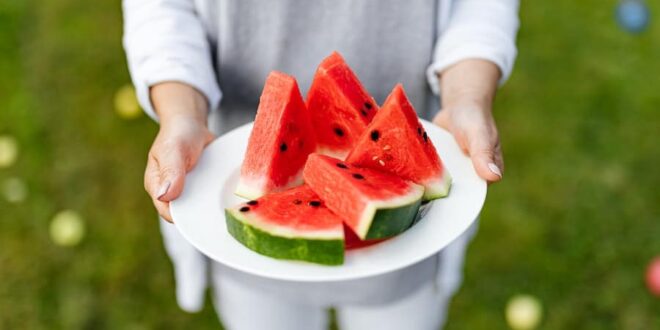You are in the right place if you are a watermelon fan and are wondering how many watermelon seeds will kill a human.
Watermelons are some of the juiciest and most refreshing fruits; most people love to gobble them down with the seeds.
But what dangers does this habit create, and how far can you take it before it becomes a severe problem?
This article will give you the best information on watermelon seeds and their potency to keep your fruit consumption at the right level. Let’s get into the details and learn more;
How Many Watermelon Seeds Will Kill A Human?
Watermelon seeds are safe for humans, and there is very little chance they could kill a human unless you choke. Overeating them can have side effects that will cause discomfort, but it won’t kill you.
Despite this, don’t eat too many of them as they have a lot of calories that could affect your weight. 30 grams per day is a healthy portion for daily consumption, and you can sprout or roast them to make them easier to digest.
How Can Watermelon Seeds Harm People?
It is not easy to die from eating watermelon seeds since you must eat a lot before you have any severe reaction.
This might be the case, but having the seeds in moderation is also important as they can affect the body in high concentrations. Here are some of the issues that come with having too many watermelon seeds in your diet;
- Their high fiber content. Watermelon seeds have high fiber content, so in small amounts, that can help with digestion in regular people.
Those with digestive problems like irritable bowel syndrome shouldn’t have watermelon seeds as they may cause more issues.
- The risk of allergy. Watermelon seeds, especially in high concentrations, have the potential to cause allergic reactions in people with seed intolerances.
- High potassium concentration. Potassium is harmful to kidney disease patients, and there is lots of it in watermelon seeds. So, if you are receiving kidney dialysis or have kidney problems, limit your watermelon seed consumption.
Health Benefits Watermelon Seeds
Watermelon seeds have been debated among nutritionists for decades because of their potential dangers, but they also have significant health benefits. Here are some of the positives you will get from eating a moderate amount of watermelon seeds;
1. Heart health
Watermelon seeds are a good magnesium source, essential in maintaining a healthy heart. It regulates blood pressure and supports proper heart rhythm, which reduces the risk of heart attacks and other cardiovascular complications.
2. Support for the immune system
Zinc is an essential building block for a robust immune system, and watermelon seeds have a lot of food. Zinc helps activate immune cells that fight infections and diseases since they are usually dormant until the immune system kicks in.
3. Digestive Health
Watermelon seeds have unsaturated fats and fiber, which can help support the digestive system. Fiber will improve the absorption of nutrients and promote healthy bowel movements, which are important for a healthy digestive tract.
4. Healthy skin and hair
Watermelon facemasks are popular for people who want to improve their skin quality, but this isn’t the only option. Watermelon seeds have a lot of protein and essential fatty acids to help you have healthier skin and hair.
Experts say these nutrients can help reduce inflammation and prevent acne, contributing to healthier and more beautiful skin.
5. Bone health
We need calcium to have strong and healthy bones, and watermelon seeds have a lot of it. This makes watermelon a fantastic fruit choice for developing kids, athletes, and the elderly who need additional support in the bones.
Calcium also plays a role in muscle function and proper nerve signaling.
Are There Any Side Effects Of Too Many Watermelons?
Watermelons are sweet and healthy; everyone loves them because they are watery and refreshing. But what happens when you eat too many watermelons? Here are some of the most common and severe results of excessive watermelon consumption;
It may cause digestive issues.
The most common issue with overeating watermelon is that it leads to abdominal discomfort, diarrhea, and bloating gas. Watermelons have a high concentration of fermentable short-chain carbs.
These carbs are non-digestible, or their digestion and absorption in the small intestine is slow, so they mess with the whole digestive system. They include polysaccharides, monosaccharides, and disaccharides.
Nutrition experts suggest that people with irritable bowel syndrome should stick to foods with low fermentable short-chain carbs. This digestive condition will have worse symptoms if exposed to such cards.
Intake of too many watermelons will cause symptoms like irritable bowel syndrome in healthy individuals who don’t have the condition.
Watermelons have a high fructose content, so people with fructose sensitivities should expect a stomach ache if they overeat.
Watermelons could raise your blood sugar levels.
Watermelons also have a high glycemic index; thus, eating too many can raise blood sugar levels and harm diabetes patients. The glycemic index measures a food’s effect on blood sugar within two hours of consumption.
High glycemic index food will spike the blood sugar levels, while low GI food gives a steady increase. Food with a GI index above 70 is high, and watermelon ranges between 72 and 80.
This means it is essential to watch your blood sugar levels and take only a small amount of pineapples if you have diabetes.
Increase the Risk of Developing Liver Inflammation
This is primarily a concern for people who drink alcohol regularly. Watermelons have a high amount of lycopene, which might react with the alcohol in their bodies and cause liver inflammation.
There will be more oxidative stress on the liver, which can be harmful and could worsen other risks of taking alcohol.
It could lead to orange discoloration of the skin.
This is rare, but studies have determined that overeating watermelon can cause a yellow-orange discoloration of the skin called lycopenemia. This is a variant of carotenemia, and it is caused by lycopene, which is a pigment and antioxidant.
Lycopene is responsible for the red color of watermelons, and it can build up in the outer layers of the skin and change its coloration. The study didn’t show how much watermelon you would have to eat to experience this side effect.
Luckily, the effect is rare and reversible by reducing the consumption of foods that cause it.
Watermelon Can Cause Over-Hydration or Water Intoxication
One of the best qualities of watermelons is their high water content, which makes them so refreshing. The issue with this is that too much of it will mean the body gets excess water, and it can lead to water intoxication.
Water intoxication or over-hydration is a condition where too much water is in the body, and it causes the loss of sodium. There will be an increase in blood if the excess water is not removed, which causes exhaustion, swelling in the legs, and weak kidneys.
It may Cause Cardiovascular Problems.
Watermelons are famous for being a good source of potassium, which plays a crucial role in keeping the body healthy. It strengthens bones and muscles, maintains electrolyte function, and improves the heart’s health.
Too much potassium could cause cardiovascular problems like weak pulse rate and irregular heartbeat. These conditions could be fatal for old people or those with existing heart conditions.
How Much Watermelon Is Too Much?
Watermelons are safe and healthy foods unless you overeat. This brings up an important question of how much watermelon is too much. Understanding this limit will help you stay safely below it so you don’t experience severe side effects.
Nutritionists have not defined a specific unsafe amount since most of it depends on your body. It is essential to watch how many watermelons you eat to keep your blood sugar levels low.
For instance, a 4-cup serving, 608 grams, of watermelon has a high GI index, and it provides 46 grams of carbs, with 36 coming from sugar.
This will most likely lead to a spike in blood sugar levels, which can be problematic for diabetes patients.
The United States Department of Agriculture advises consuming about 2 cups of fruit daily on a regular 200-calorie diet. This will be about 300 grams of watermelons, keeping you safe from sugar intake.
Conclusion
For the readers thinking about how many watermelon seeds will kill a human, this article must have given you much insight.
Watermelon seeds are safe for humans, and the most significant risk is choking since you will need an exceptionally high amount to die from eating them.
The seeds have fantastic health benefits in the right amounts, as they can improve bone structure and immune response. Watermelons are a sweet and refreshing source of Vitamins and minerals, so you should include them in your diet occasionally.
 Being Human
Being Human




